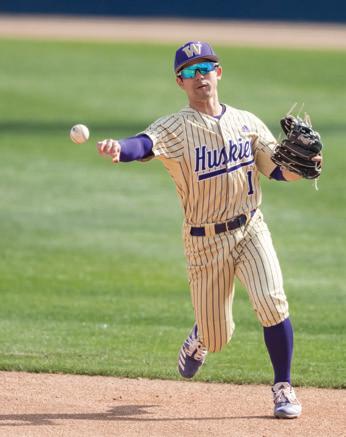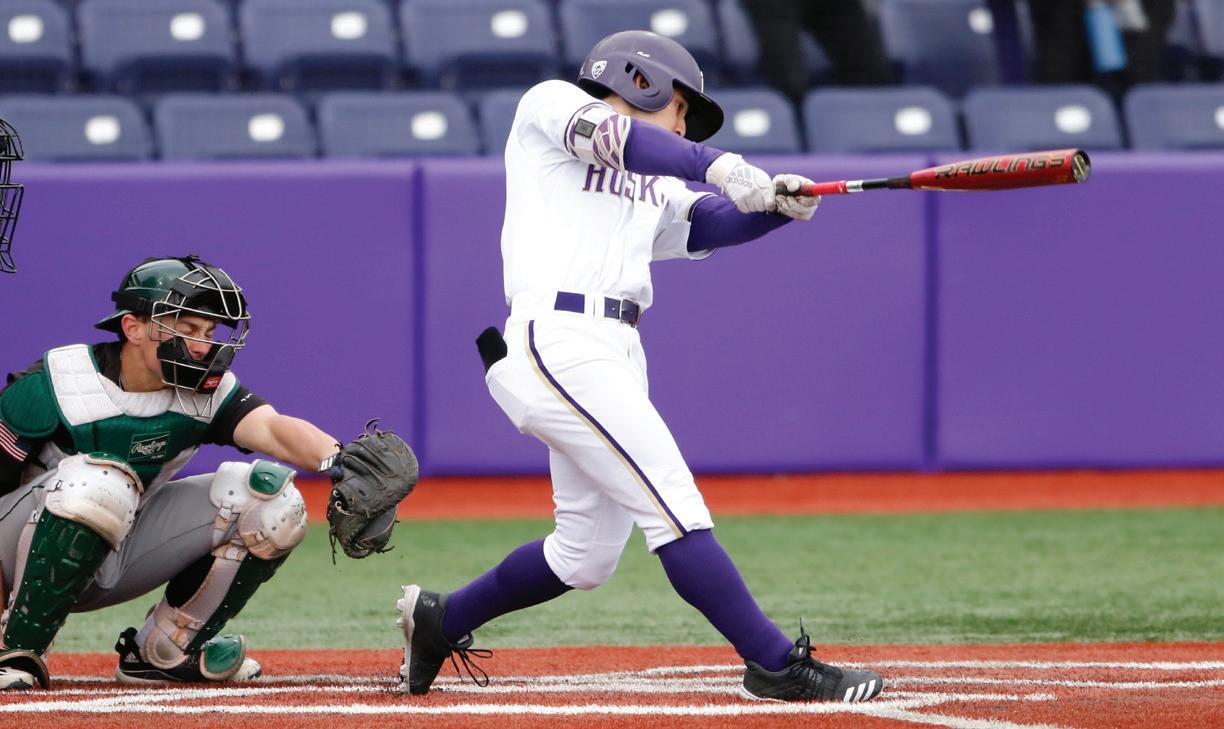
14 minute read
Noah Hsue is ready to return — just as soon as they’ll let him
READY ON-DECK
NOAH HSUE keeps perspective as his triumphant return is put on hold
BBY BRIAN TOM efore the outbreak of COVID-19 put college athletics on hold earlier this spring, Husky baseball player Noah Hsue was just starting to come into his own on the field. His story is not unlike many others at Montlake and, for that matter, around the country. He was just beginning to thrive when all the sudden, a world-wide pandemic stunted his promising season.
The third-year sophomore from Mercer Island spent his first two years in the program finding his footing. He was initially wide-eyed when he stepped onto UW’s campus as a freshman in the fall of 2017.
“I remember when I first showed up on campus about to start my first year and walking into the locker room and being like ‘Whoa, I have my name on one of these lockers.’ It didn’t feel like it was real,” Hsue reminisces.
He would play in a combined 50 games over the 2018 and 2019 seasons and had flashed his potential with clutch hits, including a walk-off winner over Arizona as a freshman. But, Hsue had yet to find the consistency – or health – to sustain his success.
That all seemed to have changed in 2020 as Hsue appeared to have turned the corner. When play was halted due to the coronavirus, he was leading the Huskies in numerous hitting categories, including average (.375), hits (18) and on-base percentage (.444). He was tied for the team lead in multi-hit games with four, including a career-best 4-for-4 in the Huskies' last outing, a 4-0 win over Utah Valley at Husky Ballpark on March 8. Hsue had finally arrived.
“For the second season in a row, Noah was off to a great start and scratching the surface of the player he's going to become,” says Ronnie Prettyman, UW's hitting coach. “What makes him tough is his ability to handle the bat. He can bunt, he can run, and he sprays the ball around on a line. Those skills make it really hard to defend him, and defenses feel that pressure when he is in the box. I'm looking forward to seeing how dangerous he can be when he gets another full season under his belt.”
Continued on page 14



Prettyman and the rest of the world are going to have to wait until next spring to see a full season of college baseball action. Just as suddenly as Hsue was starting to prove he had taken a giant step forward, he and the rest of the world were hit with a dose of reality that sent everyone reeling backwards.
Hsue and his teammates had just unloaded the bus at Sea-Tac Airport on Thurs., Mar. 12, and were preparing to check into their flight that would take them to Los Angeles for the Huskies’ Pac-12 opening series at USC when news started to circulate on social media that the conference had cancelled all action for the weekend. Soon after, the team packed all their belongings back onto the bus and headed back to Montlake.
Little did the team know as they travelled back to campus that it would be their final bus trip of the year. Two days later, on Mar. 14, the Pac-12 announced the cancellation of all spring seasons. The season was officially over before it had truly taken flight.
“It sucks. It does, but there’s not a lot you can do about it,” Hsue says about losing the year. “I think it’s important to realize that when it initially happened, it seemed kind of premature. But, looking at the way things have evolved since then, I’m not sure there was any other solution.” U nfortunately for Hsue, he is all too familiar with having his year of playing ball cut short. Last season, on March 16 – almost a year to the date of the halt of the 2020 schedule – Hsue suffered a season-ending injury on a routine play at Oregon just 14 games into the campaign.
He was playing defense and running towards third base when he stopped to plant and throw the ball home. He felt – and heard – a pop in his knee. He went back into Oregon’s training facilities where a member of the Ducks’ medical staff confirmed the worst — he had suffered a torn anterior cruciate ligament.
Hsue allowed himself the first night of the injury to grieve the loss of his season, but only that one night. He went back to the team hotel, where his roommate for the road trip and former high school teammate, Michael Petrie, helped him change out of his uniform. He then told Petrie, “You can give me tonight to cry, but by tomorrow, if you see me crying, you need to tell me that it’s time to move on.”
Hsue was determined not to let the bad news keep him down. He quickly learned that between his teammates, family, friends and team personnel, he was surrounded by an amazing support group. And, with a grueling climb ahead of him, he would count on every single one of them to lift him when he was down.
“It’s one of those things, when something bad like that happens, you really see what kind of support group you have around you,” Hsue says. “I’m really fortunate to see that I have a lot of friends that were there for me.”
Hsue began the long, slow climb back from the injury, but it was by no means an easy process. Usually, after someone tears their ACL, doctors and trainers want them moving around to keep the swelling down. But, Hsue had not only torn his ACL, but also his MCL, meniscus and posterolateral corner. The severe trauma to the knee forced him to rely on crutches for eight weeks before surgery and six weeks after it.
He would have to relearn how to walk and move his knee. He also lost strength in his hamstring as the surgeons took part of it to replace his ACL. Hsue spent countless hours with UW baseball trainer Iain Mistrot, having his knee bent and worked on in ways that were uncomfortable, but necessary on the road to recovery. `“From day one, I really admired how Noah handled himself,” Mistrot says. “His number-one goal was to make it back by the start of the 2020 season which, based on when his injury occurred, would give him a little more than 10 months to recover. He came to me and said that was what he was going to do and that he would do whatever it took to make that happen."

READY ON-DECK
By summer, he had ditched the crutches but still relied on a brace. He was walking incorrectly, swinging his leg instead of picking up his heel, so there was plenty of work to do. Since he could not play summer ball, he spent the summer taking classes and working with Mistrot on rehab. Slowly but surely, he made progress, but not at the pace he had pictured in his mind.
“I’m really impatient,” Hsue admits. “Iain probably got tired of me complaining about my lack of range of motion and asking, ‘Why is my hamstring still bugging me?’ It was one of those things where I didn’t understand why I wasn’t better yet, but I knew in my head it was supposed to take (at least) nine months. I always figured it wouldn’t take that long for me.
“It was really irritating, annoying and slow, but it was probably the right way to do it," he continues. "That’s what Iain is there for, to make sure I didn’t go out and do something stupid and make it worse, because I probably would have.”
Sticking to the normal timeline of the injury, Hsue was very limited in what he could do once fall ball arrived. He was relegated to working out on the antigravity treadmill and watching from the sidelines as other players continued their development and established themselves at second base.
In the weight room, he would show up each day with his teammates, but he was limited to working by himself on his own regimen to get back to speed. He could hit a little bit in the cages; by the end of fall, he was able to take some ground balls. Hsue knew he had some serious work to do to catch back up after winter break and be ready for the season-opener in February, but there was never a doubt in his mind that he would make it back in time.

“Medically, it might have been in question, but to me it never really was,” Hsue says about returning by the first game on Feb. 14. “I had that date circled on the calendar for a very, very long time. In my head, there was no way I wasn’t going to be ready to play by then.”
Sure enough, when practice resumed in mid-January, Hsue was back. He was determined to use the four-week break between classes to get his knee and leg as strong as possible. He had regained the range of motion in his leg and focused on regaining his strength. He spent the entirety of winter break getting back to where he wanted and with his mindset, he was able to turn the corner.
“There was not one moment where I was like, ‘It’s good now.’“ Hsue says. “It was a really slow progression of working really hard with Iain and doing work by myself at home, working on range of motion stuff all the time. But, winter break was good because I didn’t have any baseball obligations, so I could really just focus on my rehab full-time.” he work wasn’t done for Hsue, though — not by a long shot. While he had finally returned to the field from his injury, with less than a month T before the first game, Hsue now had to battle for playing time in a crowded room of second base prospects.
In the fall, established centerfielder Braiden Ward worked out mostly in the infield at second base. Freshman Dalton Chandler made a lasting impression on the coaches with his advanced approach and abilities. Junior

college transfer Tommy Williams provided a veteran and versatile presence at the position. There were even several other strong candidates fighting for time at second. Hsue had his work cut out for him if he wanted to crack the lineup in a short amount of time.
“It sucks to watch other guys play while you know you can’t,” Hsue says. “But, at the same time, it was good to see players like Dalton and Braiden become far better second basemen during fall ball. Watching them do their thing was good. It means there is competition for spots, and I think that makes everyone better.
“But, at the same time, I’m sitting on the side thinking to myself, ‘I’m putting the work in to be the guy this year and I want to be that guy,’" he adds. "So, in the end, when it’s time for me to come back and play, I’ll be ready.”
Hsue also felt like he would have to prove to the coaching staff that he was healthy enough to play in more than one game during a weekend series. He had just three weeks to show in practice and inter squad games that he was up-tospeed enough to compete and succeed as the everyday second baseman.
It didn’t take long for Hsue to shake off the rust. In the weeks leading up to the season, he was feeling more comfortable in the batter’s box. On the base paths, he was confident in starting and stopping, and trusting his knee. He was feeling more and more like his old self — and the coaches and trainer took notice.
“Noah was motivated and determined to get healthy and get back to playing baseball,” says Mistrot, who is in his fourth season as the team’s athletic trainer. “He did everything that was asked of him, every step of the way. Being able to work with athletes that have the kind of drive and determination to want to get better not only makes my job easier, but more enjoyable as well.
“It was a really cool moment watching Noah step into the batter’s box at Loyola on Opening Day," Mistrot continues. "All of his hard work had paid off and he had accomplished exactly what he had set out to.”
On Opening Day, Hsue found his name on the lineup card batting third and starting at second base. He had two hits in his first live action in 11 months, but came off the bench in the final two games of the series. After that, though, Hsue was in the starting lineup for good.




Until of course, a world-wide pandemic put an end to normal, everyday activities.
“I was off to a good start and I thought our team was going to be really talented and good this year,” reflects Hsue. “But, from a personal standpoint, compared to last year, at least I could walk and I haven’t had a major surgery and don’t have nine months of rehab ahead of me. Looking at it from that perspective, this year is bad, but it’s not as bad as last year, and I’m thankful for that.”
Despite having no games to play, Hsue and his teammates have continued to work hard on and off the field. He is staying in shape during the stay-at-home quarantine by using the gym in his parents' house on Mercer Island. When he feels the need to get some swings in, he and Petrie utilize a batting cage at a friend’s house on the island. The team is also holding regular Zoom meetings to stay connected and focused on baseball.
In the classroom, Hsue is a frequent member of the Dean’s List. He maintains a 3.68 grade point average and was admitted into the highly competitive UW Foster School of Business to focus on finance. He was a 2019 Second Team Pac-12 All-Academic selection and is poised to earn more honors in 2020 for his work in the classroom. ith his grades in order and his skills growing exponentially on the field, Hsue hopes to face a tough decision when he exhausts his W eligibility and graduates. He’ll hopefully have to weigh the decision of entering the work force with the rest of his classmates or pursuing a professional career.
Both are down the road for Hsue. Right now, he’s focused on staying healthy during these trying days and working towards 2021. It’s all he can do in these atypical times.
“I think it’s important to realize that, yeah, it sucks that the baseball season got cancelled and we’re losing a year, but there are bigger things going on than playing sports,” he says. “At the end of the day, you just have to be grown up about things and realize that this is important, and this is a dangerous thing and baseball is not priority number one anymore.
“Last year was a good lesson for me,” Hsue continues. “At the end of the day, there’s not a lot I can do about it. It is what it is. There’s no time for, ‘Why me?’ After it happens, it’s all about what you are going to do afterwards.”
That is wise – and timely – advice from anyone during a pandemic that has left the world full of uncertainty. But, when you have persevered and risen from the depths like Hsue, you can safely bet he will heed his own words, land back on his feet and make another triumphant return.





